简体中文
繁體中文
English
Pусский
日本語
ภาษาไทย
Tiếng Việt
Bahasa Indonesia
Español
हिन्दी
Filippiiniläinen
Français
Deutsch
Português
Türkçe
한국어
العربية
Rockwell Agrees $1.83M SEC Settlement
Abstract:SEC settles for $1.83 million with Brian Sewell and Rockwell Capital over a fraudulent scheme involving 15 students and the non-existent Rockwell Fund.

The US Securities and Exchange Commission settled with Brian Sewell and Rockwell Capital Management for $1.83 million after accusing Sewell of defrauding 15 students of $1.2 million. The case has brought attention to the risks associated with cryptocurrency investments, especially when they come with unverified claims of cutting-edge trading strategies.
The issue originates from Sewell's establishment of the American Bitcoin Academy, an online course that claimed to teach students the subtleties of bitcoin trading. In early 2018–mid-2019, hundreds of his students believed in the Rockwell Fund. This hedge fund was projected to be a game-changing investing platform that would leverage AI and crypto-asset trading algorithms to generate high profits for its investors.
However, the SEC's inquiry into these assertions revealed a quite different reality. The inquiry proved that Sewell's claims were hollow: the Rockwell Fund never existed, and the complex trading tactics he spoke about were never established or applied. The cash gathered from the 15 pupils, totaling roughly $1.2 million, was redirected into Bitcoin ventures. The Bitcoins were stolen from Sewell's digital wallet, causing the assets to be lost.

Given these findings, the SEC filed a lawsuit against Sewell and Rockwell Capital Management for breaching federal securities laws' anti-fraud provisions. The case highlighted the importance of regulatory supervision in the fast-growing cryptocurrency market and the risk of substantial losses from misinformation-based investments.
Sewell and his company settled rather than contest the SEC's allegations. They agreed to pay $1.83 million in fines and prejudgment interest to settle the fraud charges against them. This settlement compensates the affected students and deters future fraud.
The SEC's Division of Enforcement Director, Gurbir S. Grewal, underscored the misleading nature of Sewell's acts, including false guarantees and nonexistent technology that Sewell utilized to entice investors into his scam. This example advises investors against high-return investments, especially in volatile and opaque cryptocurrencies. They should be cautious and critical to avoid such frauds.
Keep up with financial trends, expert opinions, and major developments at https://www.wikifx.com/en/news.html. Click now to stay ahead of the competition!

Disclaimer:
The views in this article only represent the author's personal views, and do not constitute investment advice on this platform. This platform does not guarantee the accuracy, completeness and timeliness of the information in the article, and will not be liable for any loss caused by the use of or reliance on the information in the article.
Read more

Coinbase Under Scrutiny Amid Wrapped Bitcoin Delisting Controversy
Coinbase has come under fire after announcing its decision to delist Wrapped Bitcoin (wBTC), a move critics claim could be driven by competitive interests. The delisting, set to take effect on 19 December, has sparked allegations of market manipulation and concerns about fairness in the cryptocurrency ecosystem.

Solana Soars to All-Time High, Hits $264 on Coinbase
Solana hits $264 on Coinbase, breaking its 3-year high with an 11% daily surge. Learn what’s driving SOL's meteoric rise and the crypto market rally.

FCA Identifies Clone Firm Exploiting Admiral Markets' Credibility
The UK Financial Conduct Authority (FCA) has issued a public warning regarding a fraudulent entity impersonating Admiral Markets, a legitimate and authorised trading firm. The clone firm, operating under the name Admiral EU Brokers and the domain Admiraleubrokerz.com, has been falsely presenting itself as an FCA-authorised business.

Malaysian Man Loses RM113,000 in Foreign Currency Investment Scam
A 57-year-old Malaysian man recently fell victim to a fraudulent foreign currency investment scheme, losing RM113,000 in the process. The case was reported to the Commercial Crime Investigation Division in Batu Pahat, which is now investigating the incident.
WikiFX Broker
Latest News
Hackers Charged for $11M Crypto Theft Using SIM-Swaps
Role of Central Banks in the FX Market
FCA Alerts Against Sydney FX
What Makes Cross-Border Payments Easier Than Ever?
Trader Exposes Unethical Practices by STP Trading
Bitcoin Nears $100,000: A Triumph of Optimism or a Warning Sign?
Malaysian Man Loses RM113,000 in Foreign Currency Investment Scam
Mastercard Partners with JPMorgan for B2B Cross-Border Payments
FCA Identifies Clone Firm Exploiting Admiral Markets' Credibility
Coinbase Under Scrutiny Amid Wrapped Bitcoin Delisting Controversy
Currency Calculator


